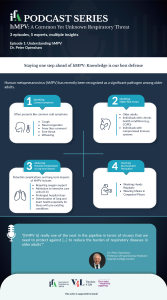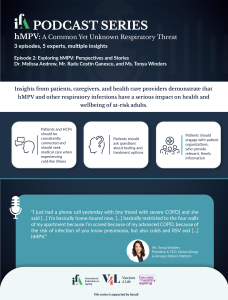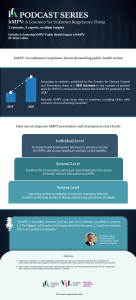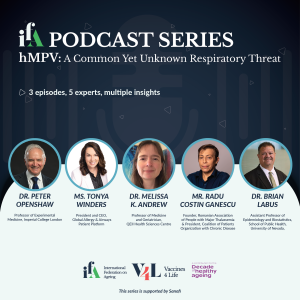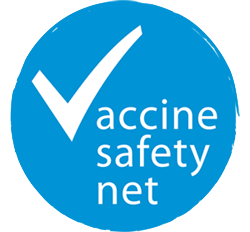Podcast Series: hMPV – A Common Yet Unknown Respiratory Threat
Most deaths from respiratory viruses occur in older adults, with the risk of infection and adverse consequences increasing drastically with advancing age. (1) Age-related deterioration of the immune system, termed immunosenescence, are directly related to the high morbidity and mortality associated with infectious diseases, particularly respiratory tract infections. (2) Additionally, as the global population ages, the prevalence of noncommunicable diseases (NCDs), including heart disease and diabetes mellitus, increases, presenting co-morbidities that increase risk of infectious diseases for older adults.
Human metapneumovirus (hMPV) is a virus that may cause respiratory tract infections, belonging to the same family of viruses as respiratory syncytial virus (RSV). (3) Symptoms of hMPV infections are not dissimilar to many other respiratory diseases that include cough, nasal congestion, fever, sore throat, and wheezing. (4) In more serious cases, hMPV may cause more severe respiratory disease, exacerbation of other chronic conditions, such as chronic obstructive pulmonary disease (COPD) and asthma (5,6), and result in hospitalization.
In this 3-part podcast series, “hMPV – A Common Yet Unknown Respiratory Threat”, the IFA aims to raise awareness of hMPV as a common respiratory disease. The series will feature scientists, clinicians and thought leaders, and the voices of older people and groups representing those most at risk of serious disease to promote comprehensive information on hMPV.
Join us in raising awareness of Human Metapneumovirus (hMPV) and its impact on respiratory health.
Our resources are now accessible in French, German, Italian, Japanese, and Spanish, making it easier than ever to stay informed. Explore the latest information and help spread awareness today!
IFA would like to thank Sanofi for supporting this series.
Explore the episodes – Now available in multiple languages!
Dive into insightful conversations and stay informed with our latest podcasts and videos. Our resources are now available in French, German, Italian, Japanese, and Spanish, ensuring accessibility for a global audience.
Simply select your preferred language, and the content will open in a new tab. Listen, share, and help spread awareness!
Episode 1: Understanding hMPV (ENG)
Meet our guests for episode two of the podcast series!
Dr. Peter Openshaw, Professor of Experimental Medicine, Imperial College of London
In episode one, an introduction and overview of hMPV is provided. The episode will address frequently asked questions, including information regarding common symptoms, risk factors for serious illness, and burden amongst older adults and other key groups.
Episode 2: Exploring hMPV: Perspectives and Stories (ENG)
Meet our guests for episode two of the podcast series!
Dr. Melissa K. Andrew is a Professor of Medicine and a Geriatrician at the QEII Health Sciences Centre in Halifax, Nova Scotia, Canada.
Mr. Radu Costin Ganescu is the founder of the Romanian Association of People with Major Thalassemia and the President of the Coalition of Patients Organization with Chronic Disease.
Ms. Tonya Winders is the President and CEO of the Global Allergy & Airways Patient Platform, an umbrella organization comprised of more than 150 patient advocacy organizations in respiratory & immunology.
With these incredible guests, in this episode, we hear from three different perspectives of patients, caregivers, and healthcare providers! Each guest shares a person-centred story on the importance of combatting hMPV.
Episode 3: Exploring hMPV: Public Health Impact of hMPV (ENG)
Meet our guest for the third and final episode of the podcast series!
Dr. Brian Labus is an Assistant Professor of Epidemiology and Biostatistics at the School of Public Health, University of Nevada.
In this final episode, we dive into the broader public health perspective, exploring the societal consequences of hMPV, as well as current research and development in this area.
Meet the speakers
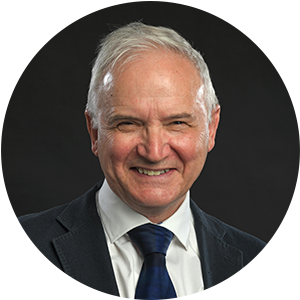 Peter Openshaw MD PhD CBE is Professor of Experimental Medicine at Imperial College London, UK.
Peter Openshaw MD PhD CBE is Professor of Experimental Medicine at Imperial College London, UK.
Peter is a physician at St Mary’s Paddington and an academic at Imperial College London. He has published over 400 publications on viral lung infections, vaccines and pandemics. He’s served on many advisory boards, grant committees and national/international scientific advisory boards and has worked on vaccines against lung infections.
He was President of the British Society for Immunology from 2013 to 2018, rebuilding governance structures and appointing a new senior management team. He has also been a Consul at Imperial for many years, promoting high standards of ethics in science. He’s well known for media work during the swine flu and COVID pandemics.
 Dr. Melissa K. Andrew is a Professor of Medicine and a Geriatrician at the QEII Health Sciences Centre in Halifax.
Dr. Melissa K. Andrew is a Professor of Medicine and a Geriatrician at the QEII Health Sciences Centre in Halifax.
She did a Masters of Public Health at the London School of Hygiene and Tropical Medicine on a Commonwealth Scholarship and completed her PhD in Interdisciplinary Studies at Dalhousie University on the subject of frailty and social vulnerability among older adults. As part of the Canadian Immunization Research Network she studies how frailty impacts vaccine effectiveness, burden of disease and clinical outcomes of infectious diseases. She is a member of Canada’s National Advisory Committee on Immunization (NACI).
 Tonya Winders, President & CEO of GAAPP, Global Allergy & Airways Patient Platform.
Tonya Winders, President & CEO of GAAPP, Global Allergy & Airways Patient Platform.
Tonya Winders is the President & CEO of GAAPP, Global Allergy & Airways Patient Platform, an umbrella organization comprised of more than 150 patient advocacy organizations in respiratory & immunology. She has more than 25 years experience as a patient, carer & advocate.

Radu Costin Ganescu, Founder of the Romanian Association of People with Major Thalassemia & President of the Coalition of Patients Organization with Chronic Disease.
In 2004, inspired to change an unwieldy health care system that offered few choices, I founded the Romanian Association of People with Major Thalassemia, together with other patients. In 2006, the Association became a member of International Federation of Thalassemia, which helped to promote modern treatment options, according to international guidelines.
In 2008, the organisation became a member of the National Alliance of Rare Disease and in 2010, the Romanian Coalition of Patients Organizations with Chronic Disease, which in turn became a European Patients’ Forum member organisation in 2011. In 2013, I was elected as President of Coalition of Patients Organization with Chronic Disease and continues to play this role.
In 2013, I was elected as board member of the European Patients’ Forum, becoming treasurer until this days. This was an opportunity to share his financial experience, working closely with the secretariat. I’ve been actively involved in key initiatives such as capacity building for patients’ associations, vaccination for patients with chronic diseases, and patient engagement in clinical studies and innovation more generally.
And starting with 2025 member of the plenary of the economic and social council in the field of health.
 Brian Labus, Ph.D., MPH is an Assistant Professor in the School of Public Health.
Brian Labus, Ph.D., MPH is an Assistant Professor in the School of Public Health.
He is an infectious disease epidemiologist with 24 years of experience in field epidemiology, outbreak investigation, and public health informatics. From 2020 through 2023, he worked extensively on COVID-19 response activities, serving on former Nevada Governor Sisolak’s Medical Advisory Team, advising various community organizations and businesses, leading a team of over 200 student contact tracers, and participating in various aspects of UNLV’s COVID-19 response. He regularly is interviewed by local, national, and international print and video outlets, including the New York Times, Washington Post, CNN, Forbes, and National Public Radio, and has been interviewed over 1,200 times on a variety of infectious disease topics, including respiratory illnesses like COVID-19, influenza and Legionella, Mpox, Naegleria, and foodborne illness.
Prior to joining the faculty, Labus worked in local public health, conducting outbreak investigations, disease surveillance, and implementing public health informatics systems. Most significantly, he led a two-year investigation into the largest outbreak of healthcare-acquired hepatitis C in United States history when over 60,000 people were exposed to bloodborne pathogens because of unsafe injection practices at an endoscopy center.
References
- United Nations. Global Issues: Ageing [Internet]. [cited 2024 Jun 6]. Available from: https://www.un.org/en/global-issues/ageing
- The Centers for Disease Control and Prevention. Respiratory Viruses and Older Adults [Internet]. 2024 [cited 2024 Sep 3]. Available from: https://www.cdc.gov/respiratory-viruses/risk-factors/older-adults.html
- Patel TA, Jain B, Raifman J. Revamping Public Health Systems: Lessons Learned From the Tripledemic. Am J Prev Med [Internet]. 2024 Jan 1 [cited 2024 Jun 6];66(1):185–8. Available from: http://www.ajpmonline.org/article/S0749379723003392/fulltext
- Falsey AR, Erdman D, Anderson LJ, Walsh EE. Human metapneumovirus infections in young and elderly adults. J Infect Dis [Internet]. 2003 Mar 1 [cited 2024 Jun 6];187(5):785–90. Available from: https://pubmed.ncbi.nlm.nih.gov/12599052/

